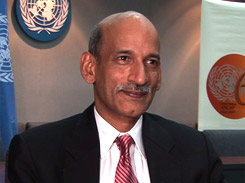

 In the wake of the 2004 tsunami in Sumatra, but also the earthquake in Pakistan and the floods that have ravaged India and Bangladesh - in India alone 25 million people have been displaced, and over a thousand have been killed - I think it is incumbent upon the United Nations, as the world's intergovernmental body, to do whatever we can to help these people who have suffered through so much.
In the wake of the 2004 tsunami in Sumatra, but also the earthquake in Pakistan and the floods that have ravaged India and Bangladesh - in India alone 25 million people have been displaced, and over a thousand have been killed - I think it is incumbent upon the United Nations, as the world's intergovernmental body, to do whatever we can to help these people who have suffered through so much. I see a definite role for the UN in bringing together the various disaster management organizations and ultimately the local governments as well. We'd like to make a coordinated effort to address natural disasters by using satellite imagery and establishing early-warning systems. If we'd had an early-warning system in place before the tsunami in Sumatra, it could have saved thousands of lives. Unfortunately, it wasn't activated. But I think we've learned an invaluable lesson in terms of risk management and in terms of dealing with crises that cannot be anticipated.
Many of our members are from the least developed countries, and quite a few of them have not yet developed the capabilities to deal with natural disasters, nor do they have access to the benefits that can be gained from information and communication technologies and space technology. So I see a distinct correlation between Sentinel Asia's objective to offer the benefits of space technology in disaster management to all the countries in the region, and UNESCAP's role as the United Nations' division overseeing issues related to information, communication and space technology. I think the Sentinel Asia project is a visionary effort. It provides a solid framework for disaster mitigation. And I think there's a great deal of complementarities between what Sentinel Asia is trying to achieve in terms of the regional cooperative mechanism, and what UNESCAP can bring to the table. So I hope we will see more opportunities arising from Sentinel Asia to utilize space technologies in the Asia-Pacific region as a whole.
We have 62 member countries in Asia alone. [Sentinel Asia has member organizations from 20 countries.] So I feel, in a sense, we provide a good platform for Sentinel Asia activities to be undertaken in collaboration with us and the UN family. One of the issues that we have been talking about is how we could expand the human resources. JAXA has the technical expertise and other requirements. But from the UN, we can bring in the human side of the equation.
If we can make a success out of our cooperation here, between Sentinel Asia and UNESCAP, there is the possibility of transferring that experience to other regions that have suffered from natural disasters, such as in Africa and Latin America. That will be a great advantage as well.